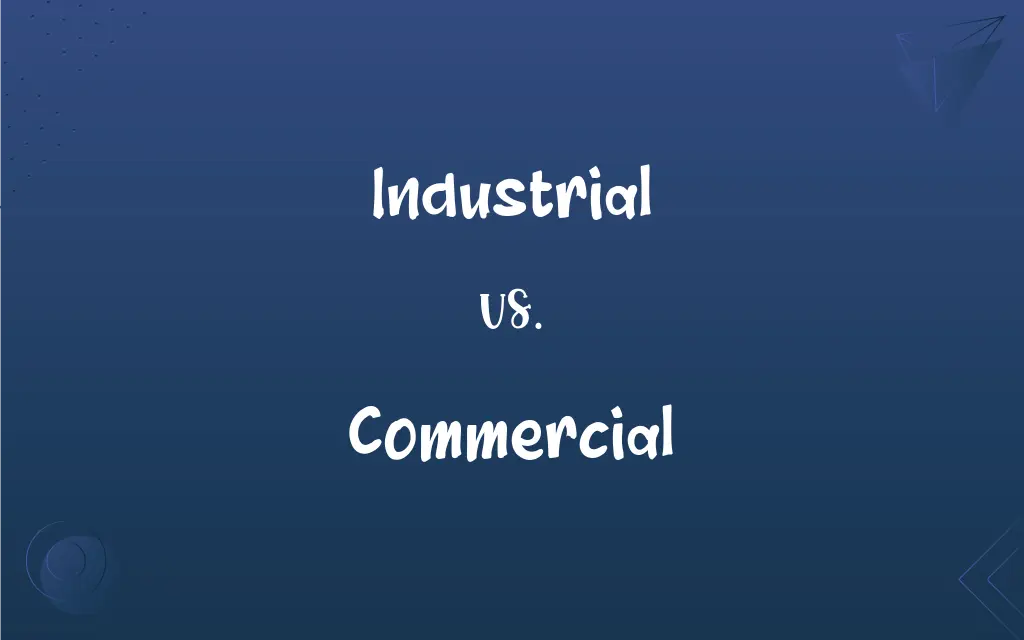Industrial vs. Commercial: What's the Difference?
Edited by Aimie Carlson || By Harlon Moss || Published on December 25, 2023
Industrial refers to production and manufacturing activities, typically in factories, while commercial pertains to business activities and trade, including retail and services.

Key Differences
Industrial primarily relates to the production, manufacturing, or construction sectors involving heavy machinery and large-scale processes. It's often associated with factories, plants, and heavy machinery. In contrast, commercial activities encompass a broader range of business practices focused on trade, exchange of goods and services, retail, and other forms of profit-oriented activities. It includes everything from small retail stores to large corporations dealing in sales and services.
Industrial sectors are often characterized by their focus on creating products or raw materials, involving significant investment in technology and machinery. This includes sectors like automotive, steel production, and construction. On the other hand, commercial activities are centered around the buying and selling of these products and services. They emphasize customer interaction, marketing, and sales strategies, operating in markets like retail, banking, and advertising.
The industrial sector typically requires a workforce with specialized skills in manufacturing, engineering, and technical know-how. It's often considered the backbone of a country's economy due to its contribution to production and export. Conversely, the commercial sector prioritizes skills in sales, customer service, and business management, playing a crucial role in the distribution and sale of industrial products and services to consumers and other businesses.
Environmental impact is another area where industrial and commercial activities differ. Industrial activities often have a significant environmental footprint due to their use of raw materials and energy. Industries like oil and gas, mining, and chemical manufacturing exemplify this. In contrast, commercial activities, while they can also have environmental impacts, are generally less directly involved in raw material extraction and heavy manufacturing processes. Instead, they focus on the utilization of industrial products in business operations, like retail businesses using manufactured goods.
In terms of economic indicators, the industrial sector is a key component in measuring a country's industrial output, GDP, and employment in manufacturing. It is crucial for the development and advancement of technology and infrastructure. On the other side, the commercial sector is essential in evaluating consumer spending, business growth, and the overall health of the retail and service industries. It reflects the demand side of the economy and plays a vital role in economic cycles.
ADVERTISEMENT
Comparison Chart
Primary Focus
Production and manufacturing of goods
Buying and selling of goods and services
Typical Locations
Factories, plants, construction sites
Retail stores, offices, business centers
Key Activities
Machinery operation, raw material processing, fabrication
Sales, marketing, customer service
Required Workforce Skills
Technical, engineering, manufacturing expertise
Sales, marketing, business management
Contribution to Economy
Product output, technological advancement, infrastructure
Consumer spending, business growth, service provision
ADVERTISEMENT
Environmental Impact
Often high due to resource use and waste
Generally lower, focused on product utilization
Scale of Operations
Large-scale, often requiring significant capital investment
Varies from small businesses to large corporations
Industrial and Commercial Definitions
Industrial
Pertaining to industries such as manufacturing or construction.
Industrial safety regulations are stringent to protect workers.
Commercial
Related to the buying and selling of goods and services.
Commercial transactions are the backbone of the retail industry.
Industrial
Characterized by mass production and industrial-scale operations.
Industrial automation has led to increased efficiency in factories.
Commercial
Pertaining to business activities aimed at generating profit.
Commercial marketing strategies are essential for business growth.
Industrial
Relating to the production of goods in factories.
The industrial revolution drastically changed manufacturing processes.
Commercial
Involving activities of commerce and trade.
The commercial district is bustling with activity.
Industrial
Involving heavy machinery and industrial equipment.
The industrial sector has a high demand for skilled machinists.
Commercial
Designed for or engaged in commerce and business.
Commercial software is often developed with user-friendliness in mind.
Industrial
Associated with the economic sector of manufacturing and production.
The country's industrial output has seen a significant increase this year.
Commercial
Connected with or engaged in the buying and selling of advertisements.
Commercial advertising plays a key role in brand visibility.
Industrial
Of, relating to, or resulting from the manufacturing industry
Industrial development.
Industrial pollution.
Commercial
Of or relating to commerce
A commercial loan.
A commercial attaché.
FAQs
What are the main features of commercial businesses?
They focus on trade, services, customer interaction, and profit-making through sales.
Are retail stores considered commercial?
Yes, retail stores are a primary example of commercial businesses.
Do industrial activities include agriculture?
Not typically; agriculture is often classified separately, though it can have industrial aspects.
Is industrial design related to manufacturing?
Yes, it involves creating designs for mass-produced products.
Can a business be both commercial and industrial?
Yes, if it involves manufacturing and selling its own products.
What are commercial rights?
Rights related to the commercial use and exploitation of an entity or product.
Can commercial activities occur in industrial zones?
Yes, but they are usually related to the industrial operations, like selling industrial products.
Are commercial flights part of the commercial sector?
Yes, as they involve providing air travel services for profit.
What defines an industrial area?
Industrial areas are zones designated for manufacturing, processing, and heavy industrial operations.
What is commercial law?
It's the body of law that governs business and commercial transactions.
Is e-commerce considered a commercial activity?
Yes, it's the buying and selling of goods and services online.
Do industrial companies only produce physical goods?
Mostly, but they can also be involved in software for industrial applications.
Is construction an industrial activity?
Yes, it falls under the industrial sector, especially in large-scale projects.
What is a commercial bank?
A bank that offers services to businesses and individuals, focusing on profit.
Can a service be commercial?
Yes, services like banking, consulting, and advertising are commercial.
What role does technology play in industrial activities?
It's crucial for efficiency, production quality, and innovation in industrial operations.
What is the industrial revolution?
A period marked by major industrialization, changing manufacturing processes.
Is commercial real estate different from residential?
Yes, it's property used for business purposes, like offices and stores.
Are industrial emissions regulated?
Yes, there are often strict environmental regulations for industrial emissions.
Do industrial jobs require specific training?
Often, yes, especially in areas like manufacturing, engineering, and technical maintenance.
About Author
Written by
Harlon MossHarlon is a seasoned quality moderator and accomplished content writer for Difference Wiki. An alumnus of the prestigious University of California, he earned his degree in Computer Science. Leveraging his academic background, Harlon brings a meticulous and informed perspective to his work, ensuring content accuracy and excellence.
Edited by
Aimie CarlsonAimie Carlson, holding a master's degree in English literature, is a fervent English language enthusiast. She lends her writing talents to Difference Wiki, a prominent website that specializes in comparisons, offering readers insightful analyses that both captivate and inform.






































































